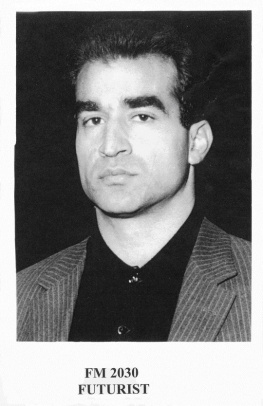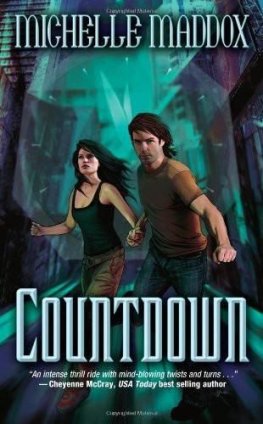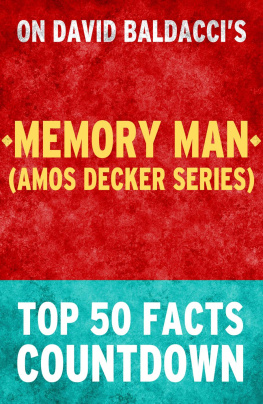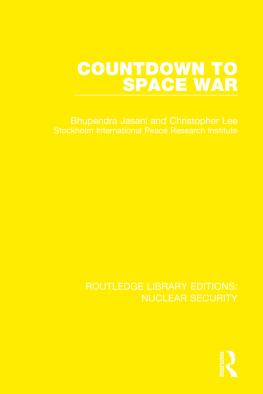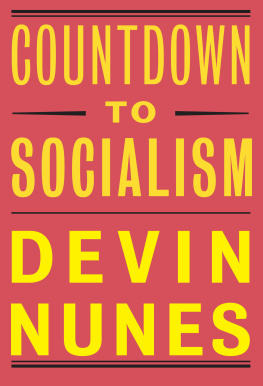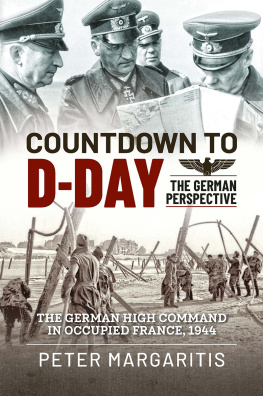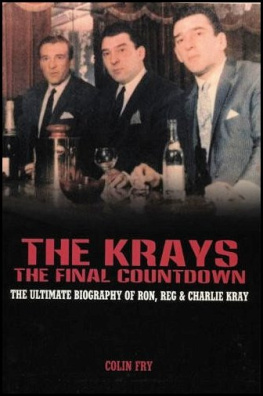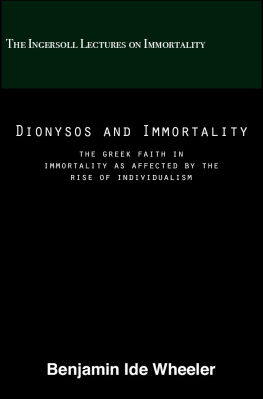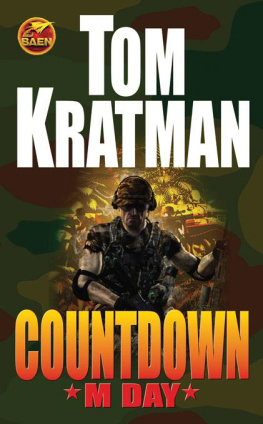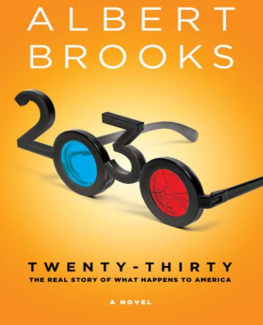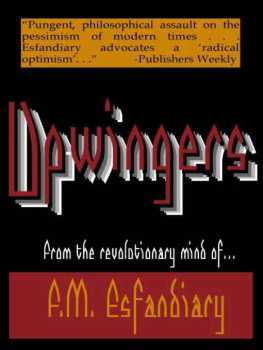FM 2030 Fereidoun Esfandiary - Countdown to immortality
Here you can read online FM 2030 Fereidoun Esfandiary - Countdown to immortality full text of the book (entire story) in english for free. Download pdf and epub, get meaning, cover and reviews about this ebook. year: 2010, genre: Religion. Description of the work, (preface) as well as reviews are available. Best literature library LitArk.com created for fans of good reading and offers a wide selection of genres:
Romance novel
Science fiction
Adventure
Detective
Science
History
Home and family
Prose
Art
Politics
Computer
Non-fiction
Religion
Business
Children
Humor
Choose a favorite category and find really read worthwhile books. Enjoy immersion in the world of imagination, feel the emotions of the characters or learn something new for yourself, make an fascinating discovery.
- Book:Countdown to immortality
- Author:
- Genre:
- Year:2010
- Rating:4 / 5
- Favourites:Add to favourites
- Your mark:
- 80
- 1
- 2
- 3
- 4
- 5
Countdown to immortality: summary, description and annotation
We offer to read an annotation, description, summary or preface (depends on what the author of the book "Countdown to immortality" wrote himself). If you haven't found the necessary information about the book — write in the comments, we will try to find it.
Countdown to immortality — read online for free the complete book (whole text) full work
Below is the text of the book, divided by pages. System saving the place of the last page read, allows you to conveniently read the book "Countdown to immortality" online for free, without having to search again every time where you left off. Put a bookmark, and you can go to the page where you finished reading at any time.
Font size:
Interval:
Bookmark:
First Edition January 1, 2011 Copyright 2010 by Flora Schnall
All Rights ReservedPublished in the United States by:The Amagansett Press Drawer 1070
Amagansett, New York 11930
ISBN 978-0-943-95908-5
Library of Congress Cataloging-in-Publication Number 2010910473
NOVELS THE DAY OF SACRIFICETHE BEGGARIDENTITY CARD BOOKS ABOUT THE FUTURE OPTIMISM ONEUP-WINGERSTELESPHERESARE YOU A TRANSHUMAN?
 About the Author
About the Author I AM A 21ST CENTURY PERSON WHO WAS ACCIDENTALLY LAUNCHED IN THE 20TH. I HAVE A DEEP NOSTALGIA FOR THE FUTURE. FM-2030
When I first met FM in 1966, he had a conventional name. He changed his name to FM-2030 to reflect his beliefs and his confidence in the future. Conventional names define a persons past: ancestry, ethnicity, nationality, religion. Long ago I outgrew such territorialities. I am not who I was ten years ago, and certainly not who I will be in twenty years. He believed that by the year 2030 humans could opt to be ageless with the chance to live forever. The year 2030 may be too optimistic, but I see the goal as attainable. Reading this book might bring you to share my certitude.
Son of a high-ranking diplomat, FM lived in twelve countries in the first eleven years of his life. This influenced him profoundly, causing him to think of himself as a global citizen, a goal he believed we should all share. A noted author and teacher, he was also a consultant to business, industry, and government. His books include several pioneering volumes on the Future: Optimism One, Up-Wingers, Telespheres, and Are You a Transhuman? His novels include Day of Sacrifice , chosen by the United States State Department as required reading for their employees, The Beggar and Identity Card. The latter was reviewed in The New York Times by Ann Tyler during the time of the Iranian Revolution. Ms. Tyler wrote: it is the perfect way to find out why so many fists are raised in Iran today.
FM-2030 played basketball in the 1948 Olympics for Iran, attended the University of California in Los Angeles, taught at the New School for Social Research in New York City, at the Florida International University in Miami, and at UCLA. A visionary, a dreamer, a social critic, an eternal optimist, a Futurist with a hailstorm of ideas, a Humanist, he was larger than life. The New York Times wrote: Many of his ideas were prescient. As you read, you will see this is true.
The author may yet achieve his vision of immortality. In his own countdown, he is presently suspended at a cryonic facility in Scottsdale, Arizona, waiting to lead us to the Future.
Flora Schnall, Editor Foreword Theres something I think you should know as you read this foreword, and this book. Im dying.I have a congenital degenerative condition that is progressive and, as I write, absolutely untreatable. It affects all my organs and tissues. So far, my symptoms are subtle detectable only by an expert eye but they will become increasingly debilitating with time and will certainly kill me eventually unless a dramatic advance in medical expertise arrives in time.
Theres a ray of hope, however: in time is not particularly soon. The condition from which I suffer is, in fact, the slowest degenerative syndrome known to medicine. I will not exhibit severe symptoms for probably about another 15 or 20 years, and the chances are good that the condition will not take my life for a further 20-30 years after that. Im essentially certain to be dead in under 70 years unless medicine saves me but thats quite a long time in technology of all kinds, medicine included. And Im dedicating my years of vigorous life to spearheading the search for a solution. You may have read Jonathan Weiners excellent book His Brothers Keeper , which relates the storey of a mechanical engineer who gave up his business when his brother was found to have Lou Gehrigs disease, to dedicate himself to hastening the discovery of a cure for that. My situation is similar (I was a computer scientist originally), and in fact Weiners next book, which may be out by the time you read this, will tell my story. In short, theres a very long way to go to develop a decisive treatment for my condition, but progress over the past decade has been most encouraging.
Unfortunately, theres a catch. The approach Im taking to developing a cure is promising, yes, but itll be really, really expensive to see all the way through to clinical availability (and, in case you were wondering, no one else has any cheaper alternative ideas). And I mean really expensive: much more than the billion dollars or so that it now takes to bring a single drug to market. This therapy will consist of a combination of many treatments targeting different aspects of the decay that Im suffering. Well probably need around a billion dollars (and around a decade) just to develop a proof of concept that the treatment works, by implementing it in mice. After that, its hard even to come up with an estimate, but itll almost certainly be at least 100 billion over 15 years. Not many diseases receive that sort of investment.
But the last step of my rollercoaster story of good and bad news is, I am pleased to say, a positive one. The chance of a given sum being spent to develop a treatment for a given disease depends very heavily on the amount that can be expected to be spent delivering that treatment once it finally materializes and that depends more than anything else on prevalence: how many people actually suffer from the disease in the first place. And on this key point, Im in luck, because my condition is very prevalent indeed. In fact, its universal: youre dying too, of just the same condition as I. Two-thirds of all deaths are mainly due to this condition, and in the industrialized world its close to 90% - and everyone who dies of something else does so only because that something else gets them at a sufficiently young age that the universal killer hasnt yet advanced to a life-threatening stage.
Im talking about aging, of course. If youre thinking hang on dont most people die of cardiovascular disease, cancer, diabetes? then youre right, but theres no contradiction because those are all simple aspects of the later stages of aging. We tend to use the word disease very carelessly in this respect: to erect an artificial and ultimately fatal separation between health conditions that different people get at rather different ages and the one health condition that we all get so much more gradually and more-or-less simultaneously. Whether aging is a disease or not is a matter of terminology; whether aging is a health condition is a matter of life and death.
In the first few chapters of Countdown to Immortality , the pioneering futurist FM-2030 makes this same case in his own inimitable style, one which I defy you to read without being inspired and energized to help in the crusade against this monstrous killer. But he doesnt leave it there.
Im not fond of use of the word immortality to describe the limit of what we might achieve by technologically postponing our death I think that word has already been taken by religion and defined very clearly, as an inability to die at any point in the future, whatever physical phenomena (supernovae nearby, etc.) may occur. But in recent years Ive begun to soften on this point, because of a realization that theres an intermediate between indefinite lifespan (the sort that we would get if we defeated aging but made no other type of progress) and infinite lifespan (that is, true immortality).
Without getting too mathematical you can find out the details by looking me up on the net it turns out that, if we not only eliminate the increase with age in our risk of death (i.e., aging) but also progressively reduce (at a sufficient rate) our ageindependent causes of death, such as accidents and homicide, a proportion of those alive at the time we start to do that will live literally forever. Not everyone, so this can at best be called possible immortality but its an extremely big conceptual departure form the radioactive decay situation (where some people live a really really long time many half-lives but everyone dies eventually) that would arise if all we did was defeat aging. Maybe the fundamental structure of the Universe will stop us from doing this but maybe not.
Next pageFont size:
Interval:
Bookmark:
Similar books «Countdown to immortality»
Look at similar books to Countdown to immortality. We have selected literature similar in name and meaning in the hope of providing readers with more options to find new, interesting, not yet read works.
Discussion, reviews of the book Countdown to immortality and just readers' own opinions. Leave your comments, write what you think about the work, its meaning or the main characters. Specify what exactly you liked and what you didn't like, and why you think so.

